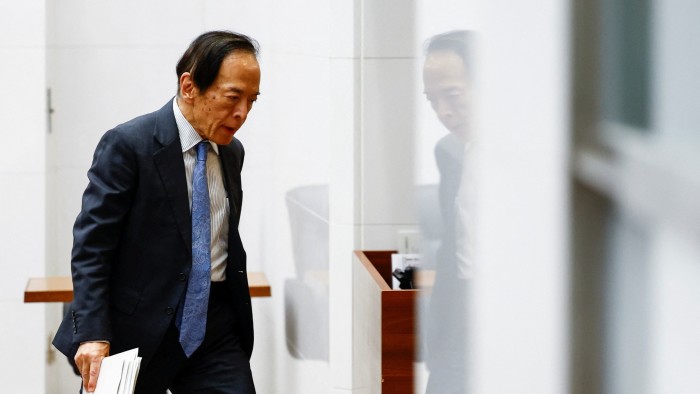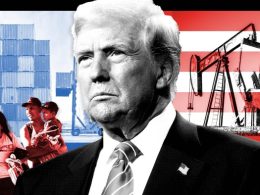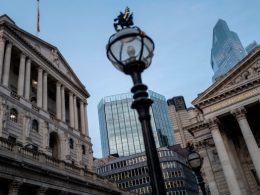Unlock the Editor’s Digest for free
Roula Khalaf, Editor of the FT, selects her favourite stories in this weekly newsletter.
The Bank of Japan is on course to raise interest rates on Friday, according to economists, as long as Donald Trump’s presidential inauguration speech does not trigger market turmoil.
A rate increase by Japan’s central bank — from the current 0.25 per cent level to 0.5 per cent — would further entrench the normalisation of the country’s monetary policy after years of negative or zero interest rates.
This week’s meeting follows mounting speculation that recent data on the state of the Japanese economy have given BoJ governor Kazuo Ueda the “one more notch” of information he said he needed when he kept rates on hold in December.
Markets have also focused on a speech by Ueda’s deputy last week that was widely interpreted as suggesting that conditions would now justify an increase. The yield on the benchmark 10-year Japanese government bond rose to 1.25 per cent — the highest since April 2011 — in the wake of his comments.
After confusion over Ueda’s comments in December, economists had been split on whether January would be too soon for an increase. But most have flipped their forecasts in recent weeks. A Reuters poll found 80 per cent of economists believed the BoJ would raise rates this month.
Although the risk of market turmoil linked to the US remained significant, “it appears that at least the BoJ’s stance on rate hikes has completely changed since December”, said Naohiko Baba, chief Japan economist at Barclays.
Still, the arguments for and against an increase remained finely balanced, economists said.
Holding rates could put further pressure on the yen. Although the Japanese currency strengthened to about ¥156 against the dollar last week on growing expectations for a rate rise, the yen remains at historically low levels, and close to where Japanese authorities have intervened in the past.
On the other hand, the BoJ will be wary of a volatile week following Trump’s inauguration — and whether, as UBS economist Masami Adachi put it, “markets [will] tumble with a panic-like magnitude”.
Governor Ueda, said Adachi, now appeared to be “very cautious” on the issue.
Officials said policymakers were wary of reigniting the kind of markets turmoil that followed the central bank’s decision to raise rates in July — a move that surprised economists, triggered accusations of miscommunication and sent the Nikkei 225 stock average down more than 12 per cent, its biggest one-day drop in history.
Even without the uncertainty surrounding Trump, economists and investors have complained of confusing signals from the BoJ in recent months, in particular the unexpectedly dovish tone of Ueda’s press conference in December.
Economists said the BoJ had not been clear on whether it believes Japanese wages are increasing sustainably after decades of stagnation — something the bank wants to see as it normalises interest rates.
Markets interpreted Ueda’s December comments to mean that he would not be satisfied about the direction of wage growth until the Japan Federation of Trade Unions released its first estimate of shunto spring wage increases in mid-March.
The summary of the BoJ’s December meeting, where one member dissented and called for an increase in rates, also pointed to a divided committee.
One member said at the meeting that there had been a “paradigm shift in corporate behaviour” that would ensure wage growth remained strong.
Another warned, however, that consumer attitudes towards rising prices were “still severe” and that companies would be hesitant to pass wage increases into prices.
Officials at the central bank said the flow of recent economic data, reports from local businesses on the ground and testimonies from the central bank’s regional branch managers in January could give Ueda and other policymakers the confidence to move.
Economists also pointed to a speech last week by Ryozo Himino, the BoJ’s deputy governor, which they said appeared calculated to “reset” the impression of dovishness left by Ueda in December. Himino struck an optimistic tone on both Japan’s fight to put deflation and stagnation in its past and on the strength of the US economy.
Stefan Angrick, senior economist at Moody’s Analytics, said that if the Japanese economy was indeed turning a corner, it was unclear why the central bank had not already raised rates.
“All the data cited were available at the end of last year,” said Angrick, adding that it was still a stretch to argue that Japanese inflation was being driven by improving domestic conditions.
“Behaviour hasn’t changed in a way that would lead to stronger demand-driven price pressure further out,” he said. “Household budgets are still strained, and firms are piling up cash at record rates.”
Katsuhiko Aiba, Citigroup Japan economist, said Himino’s speech might be intended to express hawkishness to support the yen ahead of this weeks meeting, while in reality the central bank was planning to hold rates.
“However, if policy is left unchanged next week, a weaker yen will be inevitable in any case, so we do not see much benefit to bluffing,” said Aiba.
Source link









